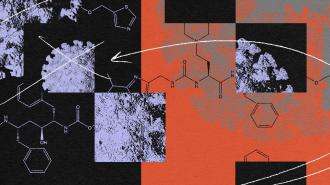An HIV drug has shown promise against a variety of coronaviruses in lab testing. While much more research is needed, the med could prove to be a valuable addition to our diminishing arsenal of antiviral treatments for COVID-19.
The challenge: Most people who contract COVID-19 will have a mild case that they can power through at home with plenty of bedrest and over-the-counter drugs to combat symptoms.
If you’re at high risk of your infection becoming severe, though, your doctor might prescribe an oral antiviral. Those meds work by preventing the virus from replicating in your body, and the FDA has approved or authorized two to treat COVID-19 so far: Paxlovid (nirmatrelvir/ritonavir) and Lagevrio (molnupiravir).
(Remdesivir is another antiviral shown to be effective at preventing COVID-19 from becoming severe, but it isn’t as widely used because it must be given as an IV, generally in a hospital.)
“We face the real possibility of reducing the gains we have made against COVID-19.”
Jerome Adams
While these meds can be highly effective at preventing hospitalizations and death, they don’t work for everyone, and people taking certain meds or with certain health conditions can’t take them.
The coronavirus could evolve resistance to them in the future, too — we’ve already seen that happen with several monoclonal antibody treatments for COVID-19, leading the FDA to withdraw approval for them.
That means we need to be thinking about alternatives to existing antivirals now, while there’s still time.
“Without prioritizing more oral antiviral options for our treatment toolbox, we face the real possibility of reducing the gains we have made against COVID-19 and being ill-prepared for the next wave and the next pandemic,” Jerome Adams, former surgeon general, wrote in an opinion piece for STAT in June.
What’s new? Rather than trying to develop a new antiviral treatment for COVID-19 from the ground up, researchers at the University of Bristol decided to study whether two oral antivirals approved to treat HIV/AIDS — cobicistat and ritonavir, which is also an ingredient in Paxlovid — could potentially treat COVID-19.
“Cobicistat…could become an effective antiviral drug both on its own and in combination with other antivirals.”
Iart Luca Shytaj
In tests on cells in the lab, they discovered that both HIV drugs suppressed a variety of coronaviruses, including the MERS virus and eight variants of the COVID-19 virus, at dosages that would be tolerable to people. Cobicistat was particularly effective.
“Our results indicate that cobicistat, at dosages above its typical clinical use as a booster, could become an effective antiviral drug both on its own and in combination with other antivirals and lead to more potent treatments than current available options,” said co-corresponding author Iart Luca Shytaj.
Looking ahead: Tests on cells are just the first step in drug development, but the researchers are encouraged enough by these results to move forward with additional studies of the HIV drug as an antiviral treatment for COVID-19 and other coronaviruses.
“If our findings are confirmed in animal and clinical studies, our results could strengthen the arsenal of antiviral drugs in the fight against current and future outbreaks of coronaviruses and reduce their impact on public health globally,” said Shytaj.
We’d love to hear from you! If you have a comment about this article or if you have a tip for a future Freethink story, please email us at tips@freethink.com.
